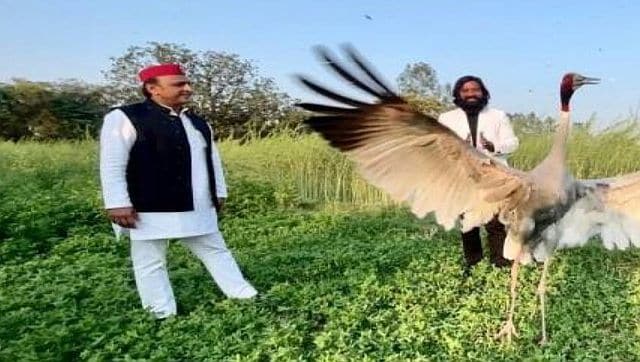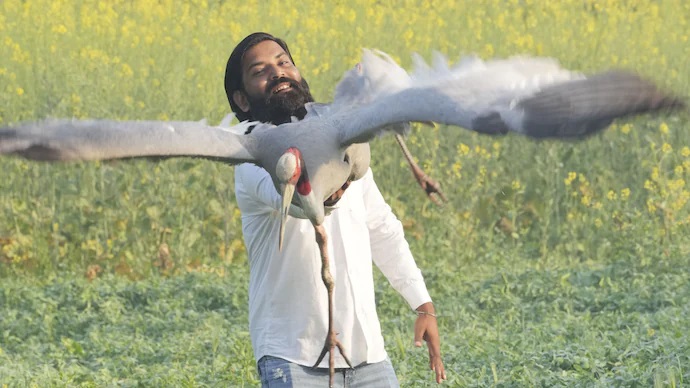Just three months ago, a heartwarming story of friendship between a 35-year-old man and a wounded crane grabbed the hearts of all. However, the Sarus crane was separated from his friend and moved away to a corner of the Kanpur Zoological Park. Now, in the zoo, the bird is slowly adapting to the ways of the wild, gradually shifting from cooked food to the more suitable diet of raw food, officials said. Training for release back into the wild The officials said the bird is under observation round the clock. “The Sarus crane is being rehabilitated for the wild by slowly changing its habit of eating cooked food like maggi, daal, rice and khichdi to eating a raw diet that is more suitable for wild birds like cranes,” zoo director Krishna Kumar Singh told PTI on Thursday. He added that the year it spent in the care of humans had turned this omnivore into an avian that looked forward to its daal-chawal and maggi. “The bird had got used to eating only cooked food. But now, it has started eating ‘superworm’ feed and varieties of dhaan (rice), pulses, coriander and green vegetables like spinach. It has also started pecking at the food on the floor instead of being fed by hand.”
The zoo officials have so far attained 80 per cent success in helping the crane adapt to a suitable diet that includes raw grains, insects, crustaceans, spinach, water hyacinth, Singh said. Arif Khan Gurjar (35), a farmer in Mandkha village in Amethi district, had found the bird injured with a wounded limb in a forest. He took care of the bird for a year and nursed it back to health. The two formed a strong bond during this time. ‘Prefers human company over wildlife’ The Sarus crane, which was shifted from the Samaspur sanctuary in Rae Bareli to Kanpur Zoo in 25 March, is presently put up in a 25x40 feet enclosure at a secret location inside the Kanpur Zoo hospital. Once the bird recovers its health completely, it will be sent back to its true home of the wilderness. The zoo director, however, said it will take more time to rehabilitate the crane into the forests as it still prefers human company over wildlife and being fed by hand. Veterinarian Dr Anurag Singh adds, “One of the biggest challenges for us was that Sarus had become extremely comfortable around humans. Whenever it sees people, it goes near them and expects to be pet by them. In fact, it treats us as if it belongs to the same species as us, which is alarming if we have to release it in the wild,” as reported by the Indian Express. So, the officials started training the Sarus to be more “independent” and adapt to the wild. Talking about the need to keep the bird in solitary confinement, the zoo director adds, “We are trying to keep the Sarus away from people so that it gets accustomed to its natural habitat. It has undergone human imprinting, which needs to be undone so that it has a chance of surviving in the wild.” ‘Can’t send it back to Arif’ Due to the Sarus’ strong bond with Arif, the zoo authorities have mulled returning it to him but a decision is pending as the step could influence others to raise wild animals illegally, another official of the zoo said. [caption id=“attachment_12618072” align=“alignnone” width=“640”] Arif Khan Gurjar (right), a farmer in Mandkha village in Amethi district, had found the bird injured with a wounded limb in a forest. Image Courtesy: @yadavakhilesh/Twitter[/caption] The zoo director explains, “We don’t want to do that because it will set a bad precedent. It will lead to the belief that the Sarus can be domesticated, which can lead to its extinction.” So, zoo officials are now trying their best to get the bird to interact with other cranes. “We are making it interact with other Sarus cranes but we are doing it slowly because we are scared that it might attack them. It won’t attack a human, but it may attack its own species. If and when we release it in the wild, we will do it with a Sarus it becomes friendly with,” says the zoo director. Officials only allowed Arif to see the bird once to see if their link was still strong. During its stay with the Amethi-based farmer, the crane used to accompany Gurjar to his fields and was accepted “like a family member”. It was, however, taken away by Forest Department officials on 21 March. Despite the bond between the bird and farmer, zoo authorities are cautiously confident that the Sarus may one day “forget Arif” and “befriend” another crane. Gurjar has been booked under the Wildlife Protection Act. With inputs from PTI Read all the Latest News
, Trending News
, Cricket News
, Bollywood News
, India News
and Entertainment News
here. Follow us on
Facebook
,
Twitter
and
Instagram
.
Arif Khan Gurjar (right), a farmer in Mandkha village in Amethi district, had found the bird injured with a wounded limb in a forest. Image Courtesy: @yadavakhilesh/Twitter[/caption] The zoo director explains, “We don’t want to do that because it will set a bad precedent. It will lead to the belief that the Sarus can be domesticated, which can lead to its extinction.” So, zoo officials are now trying their best to get the bird to interact with other cranes. “We are making it interact with other Sarus cranes but we are doing it slowly because we are scared that it might attack them. It won’t attack a human, but it may attack its own species. If and when we release it in the wild, we will do it with a Sarus it becomes friendly with,” says the zoo director. Officials only allowed Arif to see the bird once to see if their link was still strong. During its stay with the Amethi-based farmer, the crane used to accompany Gurjar to his fields and was accepted “like a family member”. It was, however, taken away by Forest Department officials on 21 March. Despite the bond between the bird and farmer, zoo authorities are cautiously confident that the Sarus may one day “forget Arif” and “befriend” another crane. Gurjar has been booked under the Wildlife Protection Act. With inputs from PTI Read all the Latest News
, Trending News
, Cricket News
, Bollywood News
, India News
and Entertainment News
here. Follow us on
Facebook
,
Twitter
and
Instagram
.
)